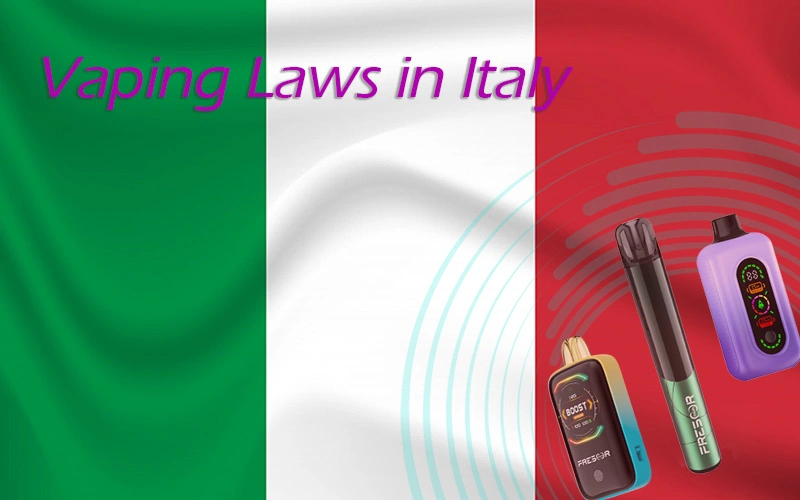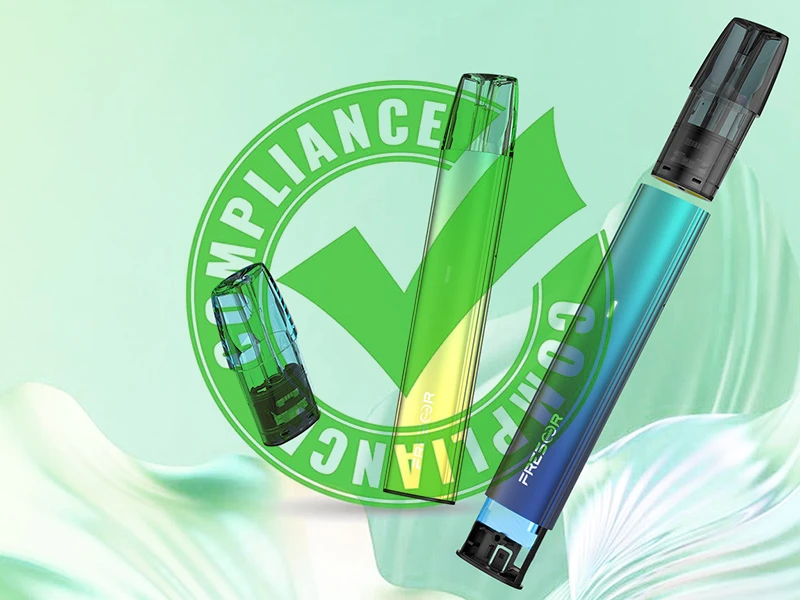Vaping Laws in Italy: All You Need To Know

12 August 2024

In recent years, there has been a rise in popularity for electronic cigarettes or e-cigarettes, whichever you choose to call it. This global surge has cut across virtually all the countries in the world, including Italy.
As vaping is becoming widely accepted as an alternative to traditional cigarettes, there is a need for governments globally to put some restrictions in place. These regulations aim to balance public health concerns with personal freedom.
This article will help you understand the laws governing vaping in Italy. As an e-cigarette user resident or visiting the Italian territory, the information contained in this guide will be crucial for you.
To begin, let's look at an overview of vaping products and the rules surrounding them in Italy.
Overview of Vaping Regulations in Italy
The regulations for vaping in Italy are a blend of both national laws and European Union directives. Since the country is part of the EU, the primary rules come from the EU Tobacco Products Directive (TPD). These directives impose strict rules on the manufacture and sale of e-cigarettes and e-liquids. Italy's Ministry of Health is in charge of enforcing these regulations.
Some of the restrictions on vaping in the country include:
Nicotine content in e-liquids should be limited to a maximum of 20 mg/ml
E-cigarettes tanks must not exceed 2 ml
Refill containers are capped at 10 ml
Tight control on packaging and advertising to prevent marketing to young people, with a mandatory health warning on all products.
Selling of vape products to young adults under the age of 18 is prohibited. Also, online sales are subject to strict verification procedures. Nevertheless, vaping still remains popular in Italy due to the public health campaigns promoting it as a less harmful alternative to traditional smoking.

History of Electronic Cigarettes Laws in Italy, including the Sirchia law
The history of e-cigarette laws in Italy reflects the evolving global stance on nicotine products. In the early days, just like many countries, Italy treated e-cigarette similar to traditional tobacco products. The aim of this approach is to protect children, non-smokers, and other vulnerable people from potential harm.
However, the Sirchia law that was enacted in 2003 marked a significant moment in Italy's regulatory outlook. The law was named after former Health Minister Girolamo Sirchia. It was during the tenure of the minister that a law was passed to regulate the ban on smoking in public and private places open to the public.
This law targets traditional smokers by influencing social etiquette around the use of tobacco. This was the foundation upon which later regulations on e-cigarettes were built.
As electronic cigarettes became popular, the Italian government implemented stricter controls to ensure consumer safety. Today, there are regulations for the manufacture, sale, and advertising of e-cigarettes, promoting discreet use and reducing health risks.
However, the Sirchia law was amended in 2013 to remove the ban on vaping. The EU vaping rules have an impact on Italy, with the Tobacco Products Directive setting out maximum nicotine concentrations and maximum volumes for cartridges, tanks, and nicotine liquid containers.
Vaping Restrictions in Italy
Vaping rules are designed to protect public health and align with tobacco control efforts. These regulations cover various aspects of vaping, from indoor bans to specific prohibited areas.
Ban vaping in indoor public places and workplaces
The Italian government enforces a strict ban on using vapes in indoor public places and workplaces such as schools, hospitals, restaurants, and public transport. The ban is similar to the laws governing traditional cigarettes. Imposing these regulations ensures that the environment remains healthy for non-smokers. These new rules aim to reduce secondhand vapor exposure and align vaping laws with those for tobacco products.
The ban on smoking in open-air places in the presence of minors and pregnant women will be extended. Smoking rooms in closed premises will no longer be allowed.
Prohibited areas for vaping, including schools and hospitals
Vaping is prohibited in certain public places such as schools, hospitals, public transport, and private places open to the public. This reflects the government's commitment to safeguarding vulnerable populations.
Restricting the use of disposable vapes and other nicotine products in these locations is vital. It helps the government protect children and patients from potential health risks. These measures ensure that the use of e-cigarettes and tobacco products is limited in critical public health environments, maintaining a safer market for vapers and non-smokers alike
Anyone who violates the vaping ban is subject to an administrative fine ranging from 27.50 to 275 euros.

Electronic Cigarettes in Italy
As a good alternative to traditional tobacco smoking, electronic cigarettes are becoming popular around the world. Below is what you need to know about the rules the Italian government offers its country:
Age Restriction for Vaping in Italy
The Italian government has established strict age restriction for vaping. You must be 18 years or older to buy e-cigarettes or related products in the country. These regulations was also extended to flavours and market campaigns. They are to protect young people from the harmful effects of nicotine, addictive flavours, and tobacco use.
Similar to the laws in the UK and Turkey, the Italian government's age regulation is part of the effort to curb youth smoking.
Sales and marketing regulations for e cigarettes
Businesses require a license before they can sell vape products to users. Also, in 2022, the government also introduced taxes on the production, import, and wholesale distribution of vape products. Furthermore, there are restrictions on liquid nicotine concentrations and a ban on marketing that targets minors.
These measures were introduced in the country to prevent illegal sales and limit advertising. The idea is to ensure the market remains controlled and to minimize the potential for harmful health impacts.
Debating a Ban on Disposable E-Cigarettes in Italy
The debate over whether or not to ban disposable e-cigarettes is gaining traction, with strong opinions on both sides.
Arguments for and against banning disposable e cigarettes
Pediatricians and patient organizations are calling for stricter rules on disposable vape products. This is due to concerns about their potential risks, such as environmental impact and potential to encourage tobacco smoking among young people.
The World Health Organization (WHO) has called for stricter regulations on vape products, citing a lack of evidence that they are an effective smoking cessation aid and growing evidence that they can act as a gateway to cigarette smoking.
They make sense of the ban by highlighting the disposable nature of these vape devices, which leads to significant waste. Additionally, the presence of liquid nicotine in these products poses health risks.
However, opponents argue that banning disposable vapes could break the progress made in helping smokers quit traditional cigarettes. They believe that these disposable vapes offer a less harmful alternative and that consumers should be aware of their choices.
Potential impact on the vaping industry in Italy
A ban on disposable e-cigarettes could impact the vaping industry in the country. If disposable vape products are banned, the vaping industry could see significant changes. Vape bars and shops might experience a decrease in sales, leading to a shift toward reusable devices.
This move could also push the industry to innovate more sustainable products. However, it may create a black market, complicating regulatory efforts. Although there are no plans to ban vaping by the Italian government, setting a date for any such ban would be crucial for businesses to adapt and for consumers to become aware of the new regulations.

Vaping in Public Places in Italy
In view of addressing public health concerns, below is what you need to know about smoking e-cigarette in public:
Vaping on board: rules for trains, planes, and ships
Vaping is no longer allowed inside trains, planes, and ships. Major Italian railway trains, such as Trenitalia, Nuovo Trasporto Viaggiatori, and Trenord, have banned the use of vaping devices. This decision aligns with the broader European trend where vaping has been banned on most public transportation. In the past, smoking and vaping were common, but stricter rules have since been introduced to protect public health.
Vaping in outdoor public areas: restrictions and allowances
Vaping is allowed in outdoor public areas, but managers of premises have the freedom to prohibit vaping. Normally, this choice should be indicated with appropriate signs, but this is not always the case. This can lead to confusion and may even seem illegal to some. The Italian government has taken a cue from the UK, where similar regulations exist. A review of these rules may happen to make them clearer.
Frequently Asked Questions About Vaping in Italy
Is vaping allowed indoors in Italy?
No, vaping is not allowed indoors in public places such as restaurants, bars, and offices. This regulation was approved to extend the protection against secondhand smoke and vapor exposure, similar to traditional smoking bans.
Are there age restrictions for purchasing vapes in Italy?
Yes, you must be 18 years or older to purchase vapes. This law was approved to prevent minors from accessing potentially harmful products, reflecting a similar approach to the regulation of tobacco and medicinal products.
Can I vape on public transportation in Italy?
No, vaping on public transportation, including trains, planes, and ships, is not permitted. Major transport companies like Trenitalia and Nuovo Trasporto Viaggiatori have implemented these bans in accordance with government regulations.
Is it possible to vape an electronic cigarette in the car?
Currently, there are no specific provisions that prohibit vaping electronic cigarettes inside the car.
I'm wondering, can I vape in outdoor public areas?
While vaping is generally allowed in outdoor public areas, individual premises can prohibit vaping at their discretion. It makes sense for businesses, especially those that serve food, to have the autonomy to decide whether to allow vapes on their premises. Always check for signs indicating any prohibition to avoid issues.
Featured Articles

Can You Vape in a Hotel Room? A Guide for Travelers, Vapers, and Hoteliers
2024-09-19

Vape Legal and Regulatory Weekly Report - September 14, 2024
2024-09-14

Vape Legal and Regulatory Weekly Report - September 9, 2024
2024-09-09

Vape Legal and Regulatory Weekly Report - September 2, 2024
2024-09-02

Vaping Laws in Germany: An Update on What You Need to Know
2024-08-12




















